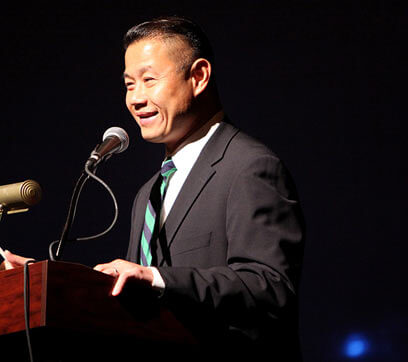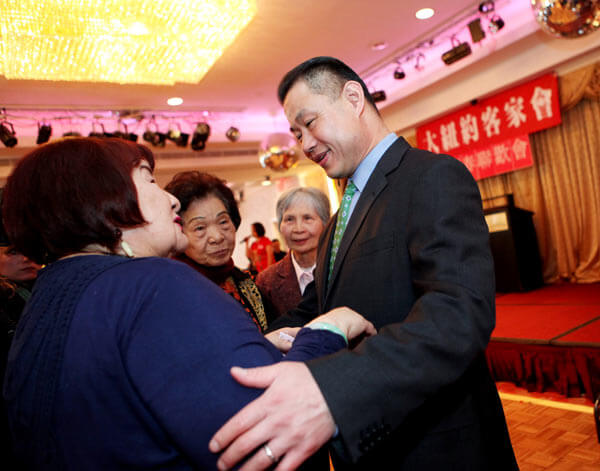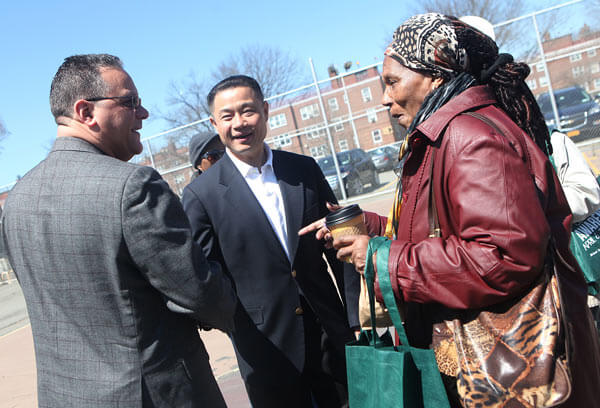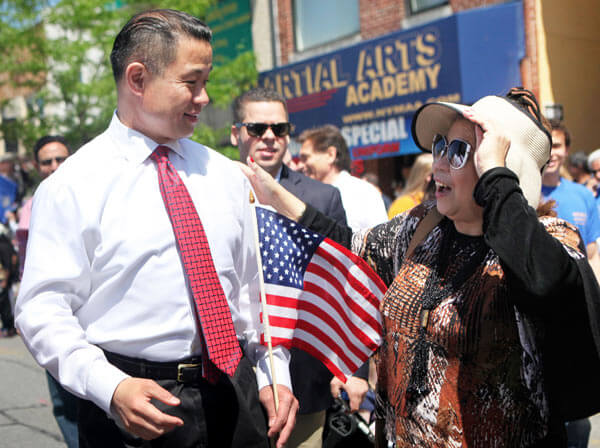By Rich Bockmann
Count John Liu as yet another public official whose immediate plans come Jan. 1 were only to take some time off.
“I haven’t decided what I’m doing next month or next year,” said the city comptroller, who joins a list of outgoing electeds who remain coy about their post-public office lives. “There are a couple of options, but I’m not rushing into anything.”
This year marks the first time Liu has found himself out of the public sector since 2001, when he was elected to represent the Flushing area in the City Council, and he did not rule out the possibility of running for elected office in the future.
“I’m not going away, so I will be fully involved in what’s going on here in Queens and in New York City, whether I’m an elected official or not,” he said in a recent interview with reporters and editors at the TimesLedger offices.
After graduating from Bronx Science High School, Liu earned a degree in mathematical physics from Binghamton University in 1988 and went on to manage a team of actuaries at PricewaterhouseCoopers.
From there Liu served two terms on the Council, where he chaired its Transportation Committee, and in 2009 he was elected to serve as the city’s chief fiscal and auditing officer.
“Over the past four years I’m pretty satisfied — if not proud outright — of the $5 billion we have saved through audits, very vigorous audits and contract reviews,” he said. “This is $5 billion that would have otherwise led to steeper cuts in services in the budget.”
Liu said that when he took office, he made it a goal to create more transparency at the city Department of Education and the New York City Economic Development Corp., which often put him at odds with Mayor Michael Bloomberg.
“It’s somewhat disheartening to be accused of politics when we were just simply trying to do our job, especially when it came to our audits and our review and sometimes rejection of contracts,” he said. “I just feel that the Bloomberg administration’s definition of being political is when you didn’t agree with them 100 percent of the time, which we didn’t.
“But people of this city elected me to do the job of comptroller independently and I can look everybody in the face and say I did the job independently, and that’s what counts,” he added.
Liu had ambitions to move into Gracie Mansion, but his efforts were plagued by a federal investigation into his mayoral campaign’s fund-raising practices.
Dating back as early as 2010, the Federal Bureau of Investigation began tapping the phones of Liu and a number of his campaign workers.
Liu was never charged with any wrongdoing, but two of his campaign staffers — treasurer Jenny Hou and fund-raiser Oliver Pan — were charged in a conspiracy to use straw donors to fill the campaign’s coffers.
Liu, however, said there was no way his campaign could have known that his donors were being reimbursed by an undercover FBI agent.
“How could we possibly know that these campaign contributions were illegal because they were going to be reimbursed?” he asked. “I have no problem if our campaign was required to check six months of bank statements from each and every one of our donors, so long as every other campaign is required to do the same, but no campaign is held to that kind of standard.”
“If they had done this with any other campaign, they wold have gotten the same results,” he added.
Hou was convicted of attempted wire fraud, obstruction of justice and making false statements. She is appealing her conviction. Pan was found guilty of conspiracy to commit wire fraud and attempted wire fraud.
Liu’s mayoral hopes were ultimately dashed when the city Campaign Finance Board, citing potential fund-raising violations, denied him more than $3.5 million in matching funds, leaving him unable to compete with the other candidates.
“It sunk my campaign. We weren’t able to get the message out. All my rivals had millions of dollars of TV commercials up and running and I didn’t have a single one,” he said. “Ultimately, that’s what weakened my campaign the most, to the point where even some of my strongest supporters didn’t know I was still a candidate.”
As for his successor, Liu said he has been working to smooth the transition for Comptroller-elect Scott Stringer.
Audits, he said, generally take a year to complete and cover a period of time three to four years back.
“So by the time you’re looking at any significant amount of initiative undertaken by a new administration, you’re two to three years into that,” he said. “So Scott Stringer, as comptroller — most of his work for the first half of his first term is going to be looking at what happened under the Bloomberg administration.”
When asked if he made any suggestions as to where the incoming comptroller should start looking, Liu replied, “Yeah. Yeah, absolutely.”
Reach reporter Rich Bockmann by e-mail at rbockmann@cnglocal.com or by phone at 718-260-4574.








































